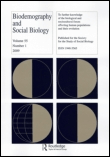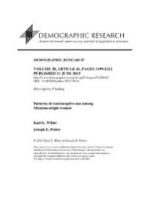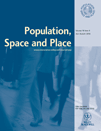
POPULATION AND ENVIRONMENT
Scope & Guideline
Navigating the Complexities of Population and Environment
Introduction
Aims and Scopes
- Population-Environment Interactions:
The journal prioritizes studies that examine how demographic changes, such as migration, fertility rates, and aging populations, impact environmental conditions and resource use. - Impact of Climate Change:
Research on the effects of climate change on human populations, including health outcomes, migration patterns, and socio-economic implications, is a core focus. - Social Vulnerability and Resilience:
The journal emphasizes the importance of social factors, such as inequality and vulnerability, in understanding how populations respond to environmental stressors. - Health and Environmental Quality:
It explores the relationship between environmental quality (e.g., air and water pollution) and public health, particularly among vulnerable populations. - Methodological Innovations:
The journal encourages the use of diverse methodologies, including quantitative modeling, qualitative research, and mixed methods, to address complex population-environment issues.
Trending and Emerging
- Climate Migration and Displacement:
An increasing number of studies focus on how climate change drives migration and displacement, emphasizing the need for understanding the socio-economic implications of these movements. - Health Impacts of Environmental Change:
There is a growing trend in exploring the health implications of environmental changes, particularly how climate and pollution affect vulnerable populations, including children and the elderly. - Social Inequality and Environmental Justice:
Research on environmental justice, particularly how socio-economic status influences vulnerability to environmental hazards, is gaining prominence. - Complex Household Dynamics:
Emerging studies are examining the complexity of household structures and their implications for environmental decision-making and resource management. - Integrated Approaches to Sustainability:
There is a notable increase in interdisciplinary research that integrates social, environmental, and economic factors to propose sustainable solutions to population-environment challenges.
Declining or Waning
- Historical Population Studies:
Research focusing on historical population dynamics and their environmental impacts has seen a decline, possibly overshadowed by more contemporary issues related to climate change. - Static Demographic Models:
There is a waning interest in traditional demographic models that do not account for environmental variables, as newer, integrated approaches gain popularity. - Single-Factor Analyses:
Studies that isolate single factors (like economic variables) without considering the broader environmental context are becoming less common, as the field moves towards more holistic analyses. - Urbanization Effects:
The focus on urbanization as a standalone theme is decreasing, with more emphasis now placed on rural and peri-urban interactions with environmental changes. - Disaster Recovery Studies:
Research specifically centered around disaster recovery processes is less frequent, as attention shifts to proactive measures and adaptation strategies.
Similar Journals

Biodemography and Social Biology
Unveiling the Complexities of Human Behavior and DemographicsBiodemography and Social Biology is a distinguished academic journal published by Routledge Journals, Taylor & Francis Ltd, focusing on the intersections of demographic and biological sciences. With its ISSN 1948-5565 and E-ISSN 1948-5573, this journal contributes significantly to the fields of anthropology, demography, and social biology, making it an essential resource for researchers and professionals alike. The journal has consistently achieved high rankings, notably placing in Q2 in both anthropology and demography, underlining its impact in these critical areas of study. Although it does not provide Open Access options, the journal's rigorous peer-review process ensures the highest quality of academic discourse and research dissemination. Covering a wide scope of topics related to human population dynamics, health, and behavior, Biodemography and Social Biology serves as a vital platform for advancing knowledge and understanding of the biological and social factors influencing human societies since its inception in 1990. Researchers, students, and professionals are invited to contribute their findings and insights, enriching the academic conversation that this journal fosters.

Demographic Research
Connecting global perspectives on demographic evolution.Demographic Research is a leading journal in the field of demography, published by the prestigious Max Planck Institute for Demographic Research. Available in both print and electronic formats (ISSN: 1435-9871, E-ISSN: 1435-9871), this open-access journal has been a valuable resource for demographers and social scientists since its inception in 1999. With a commendable impact factor and ranked Q1 in its category, the journal demonstrates a significant commitment to advancing our understanding of demographic trends and their implications across contexts. Hailing from Germany, the journal's rich international perspective adds depth to its studies, making it a vital platform for innovative research. Researchers, professionals, and students are encouraged to engage with its wealth of articles that not only document demographic changes but also offer insights critical for policy-making and social planning. The journal's broad scope encompasses diverse themes, providing a comprehensive overview of the demographic shifts that shape societies today.

European Journal of Population-Revue Europeenne de Demographie
Advancing Demographic Insights for a Changing WorldWelcome to the European Journal of Population-Revue Europeenne de Demographie, a premier scholarly publication dedicated to advancing the field of demography. Published by Springer since 1985, this journal has established itself as a vital resource for researchers, professionals, and students interested in population studies, evidenced by its Q1 ranking in Demography for 2023 and a notable Scopus ranking within the top 20% of its category. With an ISSN of 0168-6577 and an E-ISSN of 1572-9885, the journal provides a platform for high-quality, peer-reviewed research, contributing to the understanding of population dynamics and demographic trends across Europe and beyond. Although currently not open access, the journal ensures broad mobility of knowledge through diverse access options, aspiring to bridge theoretical insights and practical applications crucial for policy-making and societal engagement. Join us in exploring the intricate tapestry of demographic data as we examine pressing issues such as migration, fertility, mortality, and population aging in an ever-evolving global context.

Novedades en Poblacion
Catalyzing Conversations on Migration and SocietyNovedades en Poblacion is a pivotal academic journal dedicated to the interdisciplinary exploration of demographic studies, population policies, and social dynamics, published by UNIV HABANA. Since its inception in 2005, this open access journal has provided a platform for researchers, professionals, and students to disseminate and discuss cutting-edge research and findings relevant to populations in Latin America and beyond. With a commitment to high-quality scholarship, Novedades en Poblacion plays a vital role in contributing to the global conversation on demographic changes, migration patterns, and socio-economic impacts on populations. Researchers are encouraged to submit original articles, reviews, and studies that advance the understanding of demographic issues, making it an essential resource for those engaged in the fields of sociology, public health, and urban studies.

JOURNAL OF POPULATION RESEARCH
Illuminating the complexities of demographic change.JOURNAL OF POPULATION RESEARCH, published by Springer, is a premier journal dedicated to advancing the field of demographic studies. With a focus on research that addresses the complexities of population dynamics, this journal serves as a vital platform for scholars, practitioners, and students alike. It holds a commendable Q2 ranking in the Demography category for 2023, underscoring its influence and commitment to quality research. The journal spans a rich convergence of knowledge from 2005 to 2024, covering key developments and emerging trends in population research. Although it operates under a traditional access model, its impact continues to resonate throughout the academic community, highlighting the importance of robust demographic analysis in policy and planning. By fostering insightful discussions and providing access to groundbreaking studies, the JOURNAL OF POPULATION RESEARCH remains an essential resource for those eager to deepen their understanding of population issues.

Population Space and Place
Advancing Insights in Demography and GeographyPopulation Space and Place is an esteemed academic journal published by WILEY, dedicated to advancing the fields of demography and geography, planning, and development. With an impressive 2023 impact factor and categorized in the top quartile (Q1) for both demography and geography, this journal serves as a vital platform for researchers, professionals, and students seeking to explore the spatial dimensions of population dynamics. Founded in 2004 and running through 2024, it has established itself as a significant contributor to scholarly discussions, evidenced by its high Scopus rankings, including rank #18 out of 139 in demography and #165 out of 821 in geography and planning. While the journal currently does not offer open access, it remains a key resource for those involved in academic research and policy formulation. With its focus on the interplay between population trends and spatial analytics, Population Space and Place is essential for anyone aiming to understand the complexities of population geography in a rapidly changing world.

Population Review
Connecting Scholars to Contemporary Population IssuesPopulation Review, published by Sociological Demography Press, is a vital resource in the field of demography, contributing to the understanding of population dynamics and trends since its inception in 1988. With an ISSN of 1549-0955 and an E-ISSN of the same number, the journal has played a significant role in disseminating scholarly research and analysis relevant to demographic changes and their implications. Although currently categorized in the Q4 quartile, it ranks 78th out of 139 in the Scopus Social Sciences: Demography category, placing it within the 44th percentile among its peers. This journal serves as a platform for researchers, professionals, and students to engage with contemporary population issues, encouraging the exploration of new theories and methodologies. While not available as open access, its robust editorial standards and commitment to rigorous research make it an invaluable addition to the libraries of demographers and social scientists alike.

POPULATION
Exploring the Dynamics of DemographyPopulation, an esteemed journal published by the Institut National d'Études Démographiques (INED), serves as a critical platform for the dissemination of high-quality research in the field of demography. With the ISSN 0032-4663 (Print) and E-ISSN 1957-7966 (Online), this journal covers a wide spectrum of topics related to population studies, including migration, fertility, mortality, and population policy, offering a comprehensive lens on demographic trends that influence societies worldwide. Although it operates under a traditional subscription model, its rigorous peer-review process ensures that only the most impactful and relevant research findings are published. With its long-standing reputation among scholars and practitioners in the demographic domain, Population plays a vital role in shaping the academic discourse and guiding future research directions. Scholars, professionals, and students alike will find in its pages not only innovative perspectives but also critical insights that reflect the complexities of population dynamics in a rapidly changing world. For those dedicated to understanding the demographic challenges that societies face today, this journal remains an invaluable resource.

Revista Latinoamericana de Poblacion
Exploring the Dynamics of Latin American PopulationsRevista Latinoamericana de Poblacion is a distinguished open-access journal dedicated to the field of population studies, published by the Asociación Latinoamericana de Población. Since its inception in 2007, the journal has aimed to foster scholarly dialogue and disseminate critical research on demographic dynamics across Latin America. With an emphasis on diverse methodologies and interdisciplinary approaches, the journal serves as a platform for researchers, professionals, and students to engage with pressing issues such as migration, fertility, aging, and socio-economic factors influencing population trends. As an invaluable resource for the academic community, this journal not only promotes accessibility to vital research through its open-access model but also plays a crucial role in enhancing the understanding of demographic changes and their implications in the region. By focusing on the unique context of Latin America, Revista Latinoamericana de Poblacion facilitates a deeper insight into population phenomena that resonate globally.

DEMOGRAPHY
Transforming demographics into actionable knowledge.DEMOGRAPHY is a prestigious, peer-reviewed journal published by DUKE UNIVERSITY PRESS, dedicated to advancing the field of demography through scholarly research and critical discourse. With an esteemed Q1 ranking in Social Sciences and an impressive Scopus rank of #10 out of 139 in the category, this journal holds a 93rd percentile status, reflecting its significant impact on the academic community. Covering a wide range of topics related to population studies, including fertility, mortality, migration, and demographic change, DEMOGRAPHY serves as a vital resource for researchers, professionals, and students alike. Since its inception in 1964, it has provided a platform for innovative studies and influential articles that address both theoretical frameworks and applied research. Although not an open-access journal, it ensures that its contributions reach a global audience while maintaining rigorous academic standards. Engage with DEMOGRAPHY to explore and contribute to the dynamic discussions shaping our understanding of human populations in a complex world.